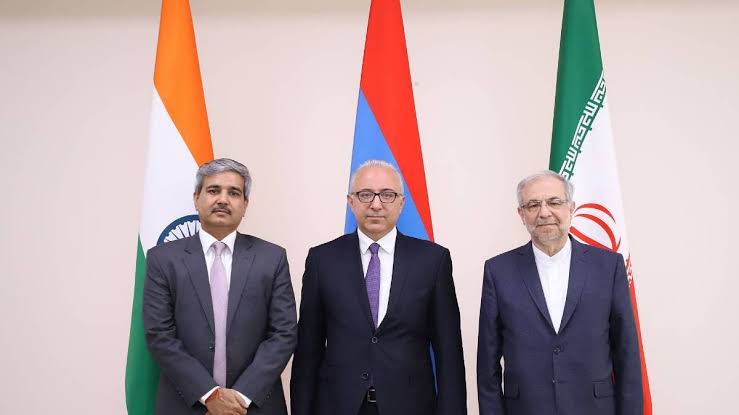India, Iran, Armenia form trilateral grouping

J.P. Singh, the Joint Secretary of the Ministry of External Affairs (Left), Mnatsakan Safaryan, the Deputy Foreign Minister of Armenia (middle) and Seyed Rasoul Mousavi, the Assistant of the Foreign Minister of Iran at the trilateral meeting held at Yerevan
Turkey, Azerbaijan and Pakistan had established a security cooperation in 2017 and have been building further on this previous bilateral military aid arrangements. Later the foreign ministers from Pakistan, Turkey and Azerbaijan held two rounds of trilateral dialogue.
In January 2021, they issued a joint declaration in Islamabad to enhance joint efforts on combating Islamophobia and “deepen inter-parliamentary dialogue”. The declaration was seen as an expression of overt support for Azerbaijan’s campaign in Karabakh, Pakistan’s claims in Jammu and Kashmir, and Turkey’s standpoint vis-à-vis the Cyprus, Aegean and East Mediterranean disputes.
Then what is known as the Baku Declaration, the three countries agreed to support each other’s territorial integrity, while underlining their respective priorities.
Nagorno-Karabakh is a disputed territory between Armenia and Azerbaijan. While Turkey and Pakistan have traditionally supported Azerbaijan in the conflict, Iran and India have supported Armenia. In November 2020, when the Nagorno-Karabakh issue flared up, it was Turkish drones supplied to Azerbaijan that gave the latter an edge.
Azerbaijan later deployed Turkish drones in the 44-day war against Armenia in 2020, which turned the tide in its favour. Azerbaijan is also believed to be in talks with Pakistan to buy the JF-17 fighter aircraft. In September 2021, Azerbaijan, Turkey, and Pakistan also held the ‘Three Brothers’ joint military exercises. The two-week-long exercise was aimed at improving military interoperability, countering regional terrorism threats in a hybrid scenario and more.
To counter the above In a first, India, Iran and Armenia held a round of political consultations in Yerevan on Thursday and agreed to hold future meetings in a trilateral format. The development comes as Armenia’s arch rival Azerbaijan, Pakistan and Turkey have been intensifying cooperation in recent years.
During the meeting in Yerevan, the capital of Armenia, delegations from the three countries held discussions on economic issues, regional communication channels and the prospects of deepening cultural and people-to-people contacts, according to a statement from the Armenian foreign ministry.
The Indian side was led by J. P. Singh, the Joint Secretary of the Ministry of External Affairs, and he was joined by Mnatsakan Safaryan, the Deputy Foreign Minister of Armenia, Seyed Rasoul Mousavi, the Assistant of the Foreign Minister of Iran, Head of the Regional General Department of South Asia.
The statement from the Armenian foreign ministry also mentioned that representatives from the three nations spoke on “trilateral cooperation”, but did not specify in what fields.
Some Iranian press reports claimed that the three countries discussed how to connect Armenia to India through Iran, using the latter’s roads and railway lines.
For India, Armenia has emerged as a key geopolitical partner in recent years. India has supplied arms to Armenia over the years and the latter has traditionally supported New Delhi on the Kashmir issue.
Armenia has turned towards India to arm itself. India has entered into a number of weapon contracts with Armenia and the recent deal was signed in late 2022 to supply weapons worth approximately Rs 2,000 crore. The weapons include the deal for Swathi Weapons Locating Radar and even the gun mounted artillery system.
Armenian Defence Minister Suren Papikyan met his Indian counterpart Rajnath Singh on the sidelines of the DefExpo held in Gandhinagar last year, looking to expand defence cooperation with India.
Armenia is eyeing more defence deals with India, including procurement of drones, counter-drone measures and loitering munitions, besides mid-range surface-to-air missile systems like the Akash.
Last month, on the sidelines of the Raisina Dialogue, External Affairs Minister S. Jaishankar held a meeting with his Armenian counterpart Ararat Mirzoyan in which they reviewed bilateral and multilateral partnership.



